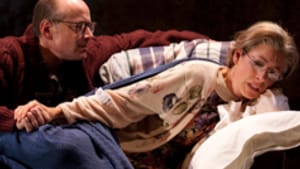Stay in the Loop
BSR publishes on a weekly schedule, with an email newsletter every Wednesday and Thursday morning. There’s no paywall, and subscribing is always free.
Scenes from a CIA marriage
Wendy Hammond's 'Absence' at People's Light

Wendy Hammond's powerful Absence, currently receiving its world premiere at People's Light, could best be described as the unlikely amalgam of two very different influences: The Four Poster, Jan de Hartog's 1951 play that followed the progression of a marriage over several decades, and Steven Spielberg's 2005 film, Munich, which explored the horrible psychological effects of a career in counter-terrorism.
Absence chronicles the relationship between Peter and Mary, a young Mormon couple. We meet them in 1945 at Harvard, where he is a brilliant young grad student. Mary has come all the way from Utah by bus, expecting Peter to propose. Though Peter initially has cold feet, he ultimately pops the question. He explains to her that one of his Harvard professors has recruited him for a government job. It's very worthwhile work, he says, but so secret that he can't tell her about it.
As the years pass, Mary must raise their children mostly on her own because of Peter's frequent absences. As these absences become more frequent, he and Mary grow progressively farther apart. And because of his guilt over what he is sometimes required to do, his behavior when he is home grows more and more erratic.
Mary too changes, abandoning her Mormon principles and turning to drink and adultery. When she was young, she says, she felt people were fundamentally good, but her experiences with Peter have led her to regard that notion as youthful sentimentality.
The marriage ultimately falls apart in incredible acrimony, to the point where Peter and Mary can't even stay in the same room during the birth of their first grandchild. In the end, though, they achieve something of a reconciliation, despite all the poison Peter's work has brought to their relationship.
Hammond incisively develops her characters and makes plausible the tremendous life changes they undergo. Under Ken Marini's astute direction, Greg Wood and Judith Lightfoot Clarke brilliantly bring these characters to life.
Wood, one of Philadelphia's finest actors, seamlessly takes Peter on an arc from idealistic young geek to dangerous CIA operative and finally to frustrated and disillusioned old man. Clarke, who bears a resemblance to the actress Allison Janney, likewise takes her character from naÓ¯ve country girl to bitter middle-aged wife to an elderly woman resigned to her lot in life. I've never seen actors age on stage more effectively than Wood and Clarke.
Note: One hour before each performance, People's Light offers a discussion series titled, "The Scoop: History, Context and Gossip," featuring a talk on a topic related to Absence. No reservations are necessary for this series.
Absence chronicles the relationship between Peter and Mary, a young Mormon couple. We meet them in 1945 at Harvard, where he is a brilliant young grad student. Mary has come all the way from Utah by bus, expecting Peter to propose. Though Peter initially has cold feet, he ultimately pops the question. He explains to her that one of his Harvard professors has recruited him for a government job. It's very worthwhile work, he says, but so secret that he can't tell her about it.
As the years pass, Mary must raise their children mostly on her own because of Peter's frequent absences. As these absences become more frequent, he and Mary grow progressively farther apart. And because of his guilt over what he is sometimes required to do, his behavior when he is home grows more and more erratic.
Mary too changes, abandoning her Mormon principles and turning to drink and adultery. When she was young, she says, she felt people were fundamentally good, but her experiences with Peter have led her to regard that notion as youthful sentimentality.
The marriage ultimately falls apart in incredible acrimony, to the point where Peter and Mary can't even stay in the same room during the birth of their first grandchild. In the end, though, they achieve something of a reconciliation, despite all the poison Peter's work has brought to their relationship.
Hammond incisively develops her characters and makes plausible the tremendous life changes they undergo. Under Ken Marini's astute direction, Greg Wood and Judith Lightfoot Clarke brilliantly bring these characters to life.
Wood, one of Philadelphia's finest actors, seamlessly takes Peter on an arc from idealistic young geek to dangerous CIA operative and finally to frustrated and disillusioned old man. Clarke, who bears a resemblance to the actress Allison Janney, likewise takes her character from naÓ¯ve country girl to bitter middle-aged wife to an elderly woman resigned to her lot in life. I've never seen actors age on stage more effectively than Wood and Clarke.
Note: One hour before each performance, People's Light offers a discussion series titled, "The Scoop: History, Context and Gossip," featuring a talk on a topic related to Absence. No reservations are necessary for this series.
Sign up for our newsletter
All of the week's new articles, all in one place. Sign up for the free weekly BSR newsletters, and don't miss a conversation.
